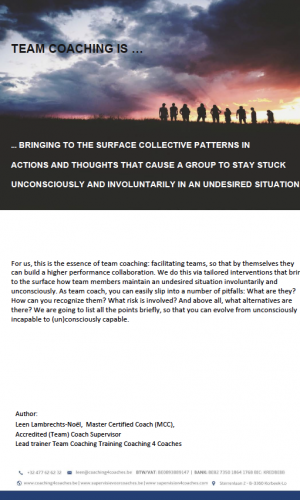Evolve from Facilitator to Team Coach
“The challenges within organisations are not in the the parts or the people — but in the connections” Dr Peter Hawkins, Professor of Leadership at Henley Business School.
Team coaching requires specialist skills and attitudes. Team coaching as an art and craft is not well known yet.
Team coaching goes much further than facilitating group exercises. A team coach needs a broad focus on the system of the group and on the group within the organisation. This system approach requires very specific skills and insights.
Team coaches nudge team members to self-observe their patterns which lead to a higher performance and better collaboration. Team coaches ask specific questions to create team awareness and support the members to conclude on their next steps towards a higher team maturity.
Teamcoaching is … creating awareness on limiting and collective patterns, which causes a group stays in a current unconscious non-desired state with non-satisfactory results. Team coaching awakens the unused potential in a team.
Team coaching is creating and broadening awareness about team patterns. The team coach will use team interventions to break old limiting habits and bring the team to the next level of team maturity. The team coach inspires, offers challenges, calls upon the responsibility of the team members to acquire competencies and integrate new collective believes to support them in the achievement of their team goals.
For us, this is the essence of team coaching: facilitating teams, so that by themselves they can build a higher-performance collaboration. We do this via tailored interventions that bring patterns to the surface how team members unconsciously and unvoluntary maintain an undesired situation.
Both a team coach and a facilitator take a structured approach to a group session, both use tools and work towards agreed and desired outcomes. Both the team coach and the facilitator are focussing on the group processes, and do rarely provide content or their own opinions.
The facilitator’s role is to support the group to manage the knowledge they have to achieve intented results such as decisions, actions plans, conflict resolution, … This role may be taken on by some one of the team itself as well. Typically, a facilitator will be providing help in structuring the dialogue, exercises, the outcomes. The methods used by a facilitator include brain storming, post-it notes exercises, brown paper methods, structured discussion exercises, etc. The facilitator will often be a intermediate person during dialogues. You can picture this role by seeing him/her as a connecting person. The facilitator feels responsible for guiding members towards the optimal outcome, within a set time frame.

The team coach is usually not a part of the team. A team coach may offer the same kind of facilitation methods and exercises but will have another focus than the facilitator. The team coach requires a clear framework on the growth path in maturity towards a high performing team and on how this team interacts within the wider organisational system. The team coach will work with the team as a whole and avoids to become a part of the team system, eg. by being an intermediate person in discussions, Based on the maturity level the team wants to grow to, the team coach often uses some kind of diagnostic framework about what could keep the team in the stuck state. The team coach may mirror the patterns that lead to success or to a status quo. The interventions of a team coach will nudge the team through challeging exercises and conscious self-observations to become more mature, more self-aware as a group, or to take on more responsibilities for the own team development. Based on the maturity of the group, the team coach will position him/herself physically more outside the group versus close to the group.
So, observing and mirroring the team patterns is his major focus. A team coach observes ‘how’ the team gets to results, and the results itself are of secundary importance.

Team coaching is getting very popular these days.
A team coaching training will make you ready to cope with difficult situations and help you to avoid common pitfalls. Download our white paper on Pitfalls for a Team Coach to warm you up for our Team Coaching Training!
In our 7-day team coaching program, we include the following building blocks:

These Testimonials are in Dutch